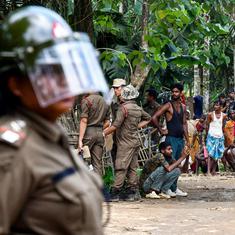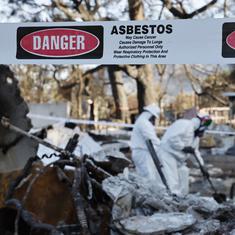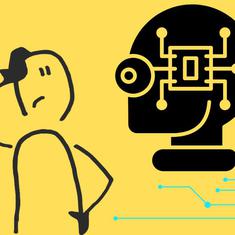Date: Sunday, 8 April 2012
Time: Around 12.15 PM
Location: Near Samartha Angan Housing Society, Lokhandwala Complex
We entered the building’s lobby and a security guard seated at the reception counter rose and smiled at us. “Good afternoon,” he said. I asked him if he’d heard about a murder in the society. The curve on his lips vanished.
“I can’t speak to anyone who doesn’t live in the society, madam. You’ll have to leave,” he said firmly. He was a small man, about five-and-a-half feet tall. Probably in his early twenties, he had a frail build, and his uniform couldn’t disguise his narrow shoulders. His boyish voice with its strong north Indian accent spoke of his fresh immigration to the city and fresher move from puberty.
As my two colleagues tried to coax some information out of him, I walked to the name board in the building’s lobby.
Bold golden letters engraved on the board’s black surface announced in capital:
101 MR ANUJ TIKKU
102 MR ANUJ TIKKU
103 MR ANUJ TIKKU
“I’m a journalist, bhaiya.” I approached the guard again and produced my press card. “Tell me one thing. The flats are in the name of Anuj Tikku and the murdered person’s name is Arunkumar Tikku. Just tell me how the two are related.’
“Madam, I’ll tell you what I know,” he said, pushing his spectacles up, “but promise me that you won’t reveal my name to anyone. You know the actor in that Shah Rukh Khan film, Rab Ne Bana Di Jodi? The one who is King Khan’s friend DK in that film?” he asked. His voice now held excitement. Bewildered, the three of us looked at each other, but nodded in unison.
“What a film! No? Anushka Sharma was in that movie. She is my favourite heroine. And the whole film was shot in Amritsar, you know. Close to my home,” he said. His fair face lit up, and his lips broke into that honest smile again. “Anyway, the friend in that film, that actor’s name is Anuj Tikku. He owns all the first floor flats; there are three of them. And the man who was murdered is his old father. I hear his paying guests did it. They are untraceable.” The guard constantly looked around as he talked, ensuring that no one was watching him speak to the press.

“Is Anuj here?” one of us asked.
“No. The police can’t find him.’
“Hasn’t he come home? Even after the murder?” We were
baffled.
“No, I hear there were some arguments between Anuj and his father. His father was not happy with his film career and wanted him to quit. But I don’t know how true this is – other watchmen were saying these things.’
“The guy wouldn’t murder his father over an argument,” I thought out aloud.
“Madam, please,” he exclaimed. “I never said that, I told you. The paying guests committed the murder – two paying guests who were living in that apartment. The father–son arguments are only hearsay.” Before we could react, he added, “Anuj Tikku is missing. For all you know, he is dead as well.” He pushed his spectacles up again.
“Paying guests?” I asked. “Is it big? The apartment?’
“Yes. Anuj saab had clubbed the three apartments into one. It has some 10 to 12 rooms.’
“Can we see it?” I asked.
“No, madam.” He raised his voice again, this time sounding outraged. “I can’t let you see the apartment. I’m helping you, but you are asking for too much. You will have to leave now. Now.’
As we turned around to leave, he spoke again. “Swear on your mothers you won’t tell anyone that I shared this information with you. Please. I will lose my job,” he pleaded, his accent getting stronger with apprehension. We hastily made our promises and left. “Looks like robbery was the motive,” I told my colleagues as we walked out of the premises. The woman journalist excused herself to make a few calls and get more information about the actor.
“Why do you think so?” the male colleague asked.
“Well, the accused are paying guests and the victim knew them. In all the recent senior citizen murders, the victim has always known the assailants and the motive was robbery.” I tried to play detective.
“Cool,” he said. “Even if the motive is robbery, tell me one thing, Sherlock – where the fuck is that actor Anuj? Did they steal him too?’
Before I could respond, the woman journalist returned with a few answers. Through the entertainment bureau of her newspaper, she’d been able to glean some background information on the actor. She’d learnt that Anuj came from an affluent family in Delhi. He was a banker, but left his job and came to Mumbai seven years ago when the acting bug bit him. To support himself here, he worked as a radio jockey and was also able to get cameo roles in big banner films, including Rab Ne Bana Di Jodi and No One Killed Jessica. But a big breakthrough continued to elude the actor. “Some other films he has acted in are Khoya Khoya Chand, Rann, Once Upon a Time in Mumbai and Turning 30,” she informed us.
“If so much is known about him, he ought to be popular in Bollywood. Man, like the dead man being rich wasn’t enough. I’m telling you, this is definitely a front-page story,” the male journalist said.

Excited, without a word to each other, the three of us started calling up the policemen who could have information on the case.
None of them answered their phones. We decided to wait discreetly in the building’s parking area with our eyes on C block, hoping that cops or the victim’s family would come by. No one came. Thirty minutes passed; no information. Despite the serious nature of the crime, the building remained free of cops.
A couple of minutes later, my phone beeped. It was my source from the Oshiwara police station, the policeman who had promised to revert to me with information. I saw he had sent me a mobile phone number with the words “Complainant, Arunkumar Tikku case” written next to it. Moving some distance away from the others, I dialled the number. There was no response. Desperate, I kept calling. On the third attempt, a man answered.
“Good afternoon, sir. This is Puja. I am calling from the Hindustan Times. Is this a good time to speak to you?” I inquired. “Yes. I’m willing to help you, provided you don’t reveal my identity in your paper. My name shouldn’t be printed anywhere,” he stated clearly. From his voice I tried to pick up clues as to his identity. I ruled out sorrow – he definitely did not sound sad.
Cannot be Anuj, I quickly deduced.
“Don’t worry about that, sir,” I assured him.
As I got out my notebook and pen, the man started talking.
He said he was a resident of the building where the senior citizen had been murdered. The previous night, he had gone to the parking area facing Anuj’s apartment to get his car as he had to buy medicines for his father. Two women were looking up in the direction of Anuj’s first floor apartment, discussing that the commotion there was probably a couple’s spat.
The complainant followed their gaze and after a few seconds, he saw a person in a red and white shirt pressing an old man’s face against a window. Struggling, the old man pulled at the curtain rod above him and the rod collapsed. The senior citizen was then turned around. The man in the red and white shirt continued to assault him while another person held the old man’s hands behind his back.
“When the two assailants noticed me in the parking area, they waved at me and smiled. They wanted to show that everything was normal, that it was only a friendly fight. Just when I was about to leave, having believed their smiles, the old man, who appeared to be around 65 years old, returned to the window and started banging his fists on the glass. I was shocked. He looked desperate and I could tell that he was trying to call for help. I immediately summoned our society’s security supervisor, and with two security guards, I rushed to the first floor apartment,” recounted the complainant.
The man in the red and white shirt opened the door.
He appeared to be around 30 years old and was now shirtless; however, his naked chest and blue jeans were stained with blood. The complainant asked him where the struggling senior citizen was. The man, who now looked scared, tried to push my informant out of the apartment. But security guards kicked the door open and they entered the property.
“I again asked him what the matter was. He looked dazed, as if he was searching for a reasonable explanation, and didn’t speak for a few seconds. I decided to look for the old man myself and walked straight in. In one bedroom a second man was lying on the bed, covered with a sheet. He appeared to be asleep. I noticed that his feet, which were jutting out of the bed sheet, were covered with blood,” the man recollected.
The complainant pulled the sheet off and the man sat up. He noticed that the man’s jeans were bloodied around his groin, as were several parts of his bare chest. He looked young. He couldn’t be the ailing old man; he was the second assailant, the complainant deduced. Scanning the room, he noticed faint traces of blood all over the floor. It was obvious the men had attempted to clean up the blood. The old man could not be safe, the complainant concluded. He then spotted a few vodka bottles in the room and asked the two men if they had been drinking.
“Yes. We were watching a cricket match, bhaiya, the Indian Premier League, and were having a couple of drinks,” replied one of them.
“Why the blood?” the complainant demanded, unconvinced. “He was supporting Hyderabad and I was supporting the opposite team. So we fought and the argument got a little out of hand,” replied the man who had opened the door.
“Where is the old man the two of you were assaulting?” my informant now shouted at them.
“He is asleep, in one of the rooms. It’s nothing, bhaiya, really. You should leave now,” one of them replied.
“Why were you beating him up?” the complainant persisted.
The duo said the man was the apartment owner Anuj Tikku’s father and that they had had an argument with him. They said the dispute was now settled, that the complainant should not prolong the matter any further, and leave. When asked about their identities, they said they were paying guests in the apartment, and paid a rent of ₹30,000 each month to Anuj.
“I couldn’t believe them. There was fear in their eyes, in their awkward pauses, in their measured words and their body language. They looked guilty. I knew they were guilty. There was blood all over them, all over the floor, and they still couldn’t tell me where the old man was. I told them to call Anuj and let me speak to him. They said he was busy shooting in Delhi. When I insisted on speaking to the actor, they dialled a few numbers and said that they couldn’t get through to him. I threatened to call the police.’
The informant said that when he took out his cell phone to dial the police, the man who had been lying on the bed rushed to him, touched his feet and requested him to leave them alone. The two pleaded that they were employed in the industrial area nearby and would lose their jobs if the police were to be involved.
“Bhaiya, career burbad ho jayega,” they begged.
Ignoring their pleas, the complainant began to dial the Mumbai Police helpline. The men were visibly afraid now, and started to put on their shirts. Both of them wore spectacles, and their polished, corporate looks made the complainant think, for a few seconds, that they were good men from decent families.
“We’re leaving,” the two announced, but the informant told them they couldn’t go until the cops arrived. The complainant and the security guards then locked the two men inside the apartment. There was still no trace of the senior citizen.
Standing outside that ₹3 crore apartment, the complainant called the cops and provided the details. He asked the two security men to guard the apartment door while he went to purchase medicines for his father. When he returned some time later, he discovered that the men had locked the apartment from inside. He started banging on the door but no one responded.
“We could hear movement inside. We knew they were still in there, and suddenly, the light in the floor’s lobby tripped. It just went off. They must have done something from inside the apartment to pull that off. Professionals, I realised. I asked one of the guards to go down to the main electricity board and fix the light. In a few minutes, the light was back on. But the sounds from inside the apartment had ceased. We kept banging on the door, but no one responded. I knew that something terrible had happened inside,” my informant said.
But despite the gravity of his complaint, the Mumbai Police did not show up for the rescue in time, the complainant alleged. They took three hours to respond fully after he made the first distress call to their emergency helpline, 100, between 10 and 10.30 p.m.
Excerpted with permission from The Front Page Murders, Puja Changoiwala, Hachette India.










